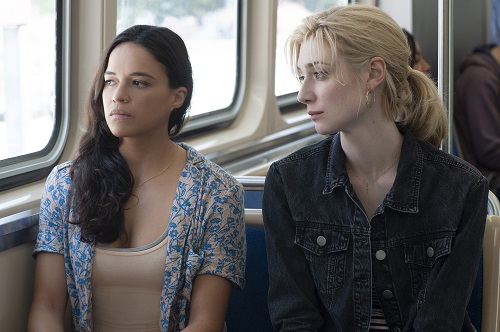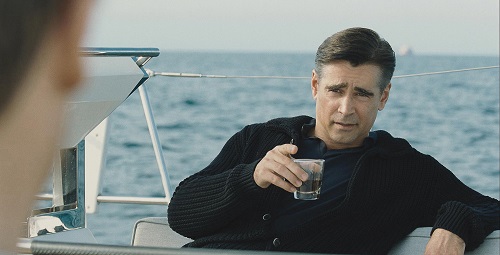By Roxana Hadadi | Film | November 21, 2018

I interviewed filmmaker Boots Riley this summer when his directorial debut, the excellent and incendiary Sorry to Bother You, came out, and he said something that seemed fairly simple but is also infinity insightful: That every movie you watch (or TV show you watch, or book you read, or whatever) is essentially an extension of the creator’s politics, and not just politics as in Democrat vs. Republican, but, socialist vs. capitalist, cynic vs. hopeful, romantic vs. pragmatist, and so on. That’s obvious—of course people create things that to a certain level reflect what they think—but it also speaks to who we are beneath what we typically consider to be “beliefs,” like religion or politics. There is more to the status quo than that.

Riley’s words are what I kept thinking of while watching Steve McQueen’s and Gillian Flynn’s Widows, one of my favorite films of the year so far. There is a lot to say about this film, set in present-day Chicago and featuring one of the best ensembles I’ve ever seen—Viola Davis, Elizabeth Debicki, Michelle Rodriguez, Cynthia Erivo, Carrie Coon, Brian Tyree Henry, Daniel Kaluuya, Colin Farrell, Jon Bernthal, Liam Neeson, Garret Dillahunt, Robert Duvall! Even Leonardo DiCaprio BFF Lukas Haas delivers! In her review from TIFF, Joelle called the film “a gritty masterpiece seething with revenge,” and Kayleigh wrote in an essay about the women in Widows that the film is “a story of crime, how it affects everyone and how certain figures are cloaked in just enough legality to get away with it.”
What I want to build on here is the idea that Widows is about revenge and crime, yes, but primarily, it’s about power—who has it, who gets to wield it, who is protected by it, who is kept away from it. This was a concept that McQueen explored with 12 Years a Slave and that Flynn mines constantly in her novels (what is Gone Girl about if not a struggle for dominance in a modern marriage?), and together they create a portrait of complex power struggles, of lines of dominance criss crossing each other, of a fragile web that can unravel if even one strand is snapped. I thought of Sorry to Bother You while watching Widows, yes, but The Wire, too, another story about a city steeped in corruption, within which individual players—some criminals, some citizens, some elected officials—pad their own pockets while most everyone else suffers.
LOTS OF WIDOWS SPOILERS AFTER THIS, SO BE AWARE
Because let’s be clear here: The women in Widows are suffering, not just because of their one-on-one relationships with their varyingly disappointing husbands, but because of a heteronormative culture in which it would be expected that these women would rely on their husbands for money, for stability, for compassion. But no one really gets that here. This isn’t like that scene in Michael Mann’s Heat where the whole crew goes out to dinner together at the behest of Robert De Niro’s paternal leader, where the wives know each other and the children are adored and gifts are passed and alcohol is poured. The women in Widows aren’t familiar with each other because it served crew leader and career criminal Harry Rawlings (Neeson) to keep his men at arm’s length—disposable and replaceable. It’s a choice that kept Harry in power, and one that reverberates throughout the film—how Harry looked out for himself.

When Harry, Florek Gunner (Bernthal), Carlos Perelli (Manuel Garcia-Rulfo), and Jimmy Nunn (Coburn Goss) all die after their failed heist, it’s four separate funerals for four separate men, and when Veronica (Davis) calls Linda Pirelli (Rodriguez), Alice Gunner (Debicki), and Amanda Nunn (Coon) to meet with her to discuss that final job, they don’t recognize each other. Amanda doesn’t even show. Instead, it’s Alice and Linda warily approaching each other at a spa, then warily considering Veronica, and smarting when Veronica says that their husbands “worked for” Harry. They worked with Harry, the women insist, but does that really matter at this point? Florek used to beat Alice, the kind of man who gave her a black eye and then would insist she cover it with makeup because “It makes me feel bad to look at that.” Carlos constantly undermined Linda in front of their daughters, casually calling her “crazy” before wasting all the money she earned at her store selling dresses and accessories for quinceañera celebrations. Why protect men who refused to protect them?
“Men are supposed to provide for you,” Alice’s abusive mother (played impressively grossly by Jacki Weaver) says before smacking her, a moment that inspired laughter in my fellow audience members (it took all my self-control not to scream at those people). But what Agnieska is really saying is an extension of the status quo: Men are supposed to care for women. Women are supposed to protect their children. Scale up that personal responsibility and you get generalizations like “Police are supposed to protect citizens” (an expectation that the movie scoffs at) and “Politicians are supposed to care about all their constituents” (more scoffing).

What is really happening in Widows is that the police could care less that these criminals are dead (“They give zero fucks about Harry Rawling’s fucking widow,” smirks Henry’s Jamal Manning, gangster and hopeful 18th Ward alderman). Longtime elected leader Tom Mulligan (Duvall) threatens his son, Farrell’s Jack Mulligan, in a tight race with Manning, with “I don’t roll over for anybody” and “You better man the fuck up” (this is after he calls Jamal the n-word, natch). And in a banger of a twist, Henry Rawling ends up being alive, having faked his own death and planning to run away with Amanda and her newborn son—their newborn son. This would mean lying to and leaving behind Veronica, with whom he had a son who the Chicago police shot and killed.
That is a hell of a lot, and yet it reiterates what Widows is saying about the structures of power, about how the white men in charge protect the other white men in charge, about who ends up benefiting from that specific kind of classist and racist solidarity. Nothing happened to the cops who killed Veronica’s and Henry’s son. Henry’s heist was planned with Jack Mulligan to screw over Manning, to steal $2 million from him, and to set up Rawling’s own exit from Chicago. Tom Mulligan is a ghoul, one that his son hopes dies sooner rather than later (Farrell says that to Duvall! It is hard as a motherfucker!), but not because Jack doesn’t want the power. He wants it his way; he wants to benefit from decades of nepotism but he doesn’t want to uphold the promises and relationships of his forefathers. He wants to build something new, entirely on his own; he wants power without history.
Jack is coveting something he can’t have; Jamal is coveting what Jack does have. As he says to Kaluuya, playing his brother and deliciously, terrifyingly evil right-hand man Jatemme, “That man owns a piece of every fucking thing. I don’t want this life anymore. I want his fucking life.” What does Jatemme want? Widows never lets us know if the blank-eyed Jatemme has ambitions or aspirations of his own, but his devotion to his brother is absolute. He gets into people’s faces; he lulls them into security; he’ll shoot someone running away in the back; he casually watches TV while his men murder someone just in the other room. Jatemme has no limits, just like Tom Mulligan has no limits; it’s Jamal and Jack who have to play by rules. In contrast, Jatemme and Tom are men grasping for power—one trying to take what the other one has, one a young man coming to snatch all at once what the old man has stolen over time. Tom gives speeches at fancy banquet dinners, confident in his privilege; Jatemme waves at his prey from across a cemetery, unafraid to intimidate with every opportunity. What a surprise that neither of them lives.
Who kills them? The widows, of course; the women they’ve underestimated at every turn, who decide to follow through on a job Harry planned but never had the gumption to attempt: to steal $5 million from Jack Mulligan that he had embezzled from the city. This isn’t to say that the power the women achieve can only come from murder, but it does develop from a place of upending the status quo, of rejecting the structures that men like Jatemme and Tom and Jamal and Jack and Henry and Florek and Carlos and Jimmy have placed upon them. The women can’t be anyone but who they are, but they pretend to be lesser than to gain people’s trust. Who doesn’t want to help a woman in need? Linda pretends to be a new employee at an architecture firm to gain the trust of a widower. Alice pretends to be an endangered Polish mail-order bride to manipulate a woman into buying her guns. Veronica pretends to appeal to Jack Mulligan for mercy while really scoping out the layout of his home. It’s only the non-widow and addition to their crew, babysitter and hairdresser Belle (Erivo), who is beholden to no one, who can stand up to Veronica upon their first meeting (her “You need to watch how you talk to me” is one of the most epic moments I’ve seen in a while), who has been self-sufficient for so long that she can do the job, but she doesn’t need the job.
The women train, they study, they practice—and they pull it off. The money is the reward, but Widows feels slightly anticlimactic when the heist is done because the moments of character growth are all related to other realms of power. Linda asserts that she’s doing this all for her kids, and the money gives her the ability to re-open her store and provide for her children so that her mother-in-law no longer poisons them against her. Alice escapes both the clutches of her mother and Haas’s sugar daddy, telling him to his face, “I don’t need you to have a nice life. You say ‘life’ like it’s yours to offer, but it’s mine”; when we see her at the end of the film, her body is covered up, wrapped in a giant coat, no longer on display, and she’s having a meal with a female companion. Belle helps her friend (played by Adepero Oduye, the lead of Dee Rees’s Pariah!) pay off her debt to the Mulligans so she can own her salon outright, and is able to take care of her daughter without her mother’s help.
And there’s Veronica, now without Jamal breathing down her neck over Harry’s theft, now with the knowledge that she no longer needs to mourn Harry, now with the realization that Amanda and her newborn son are alone, just like Veronica is, now with a school library named after her murdered son, established with the money Veronica stole. And in the final moment of the film, when Veronica runs out of the diner to chase down Alice, to ask her how she’s doing, to extend a moment of compassion to a woman for whom she once had no patience and no respect—there’s power in that, too. There can be power in kindness and in camaraderie alongside crime and corruption, and that is the nuance, the depth, and the politics Widows provides.